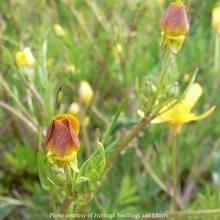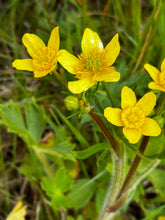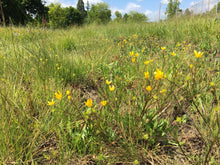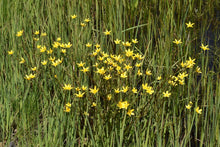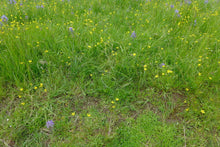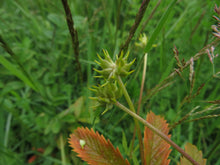
Ranunculus orthorhynchus
This showy wildflower is a close relative of western buttercup (Ranunculus occidentalis) but with a more upright tufted growth habit, a slightly taller stature, and larger flowers that come on a little later in the spring season. The cheerful blooms are shiny, bright yellow and long-lasting, giving pollinators ample time to forage to their hearts content. As flowers age, they often sport a reddish wash on the underside/outside of each petal...a very subtle, yet beautiful accent.
- Plant type/canopy layer: deciduous, perennial, herbaceous plant
-
Size at maturity: 12-24" tall, 12-24" wide
-
Light requirements: full sun
-
Moisture requirements: moist to wet soil
- Growth rate/ease: fast growing, easy to grow
-
Bloom time: mid-late spring
- Native range: most often associated with wetter and boggy areas in moist/wet prairies, marshes, meadows and forest edges, across western North America from Alaska to California to Utah, but can be found in a variety of habitats with adequate seasonal moisture. Portland Plant List – yes
-
Special features & uses: landscape used include pollinator gardens, meadowscapes, bioswales and rain gardens
Gardening with Straightbeak Buttercup: This species likes moisture so it will do well in naturally wetter areas of your landscape, such as a raingarden or bio-swale, or under regular irrigation. Attractive companions that enjoy a similar condition include species such as native rushes, monkeyflowers, native alliums and common camas. Blooms can be long-lasting and will continue into late summer with regular irrigation. If planted in favorable conditions, it will self sow.
Seeding Instructions: Sowing in fall or early spring is ideal, to take advantage of winter rains. Short stratification if any (possibly up to two weeks), so late spring is possible, if supplemental water is provided. Each packet contains approximately 150 seeds.
Photo Credit 1 (reddish petals): Heritage Seedlings & Liners
Photo Credit 2 (flowers closeup): © Michael O'Loughlin, some rights reserved (CC-BY)
Photo Credit 3 (habit): © Ed Alverson, some rights reserved (CC-BY)
Photo Credit 4 (many flowers): © Gail A Baker, some rights reserved (CC-BY)
Photo Credit 5 (meadow): © Don Boucher, some rights reserved (CC-BY)
Photo Credit 6 (fruits): © Jack Bindernagel, some rights reserved (CC-BY)






